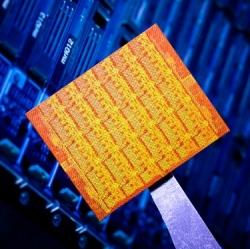
The firm says that microcontrollers based on the "Flycatcher" architecture will pave the way for the "internet of things" – the spread of the net to a wider range of devices.
It suggests that fridges and other white goods, medical equipment, energy meters, and home and office lighting will all benefit from the innovation.
Two firms have licensed the technology.
They are NXP Semiconductors and Freescale.
"It opens up all devices to the potential of being connected all the time," Freescale’s Geoff Lees told the BBC.
"It’s allowing us to provide connectivity everywhere. So anything from consumer appliances, MP3-music audio docks, kitchen equipment with displays right through to remote sensors in rain monitoring equipment or personal medical devices – an area where ultra-long battery life allied to high performance and safety is becoming more and more important."
Smarter energy appliances
The Cortex -M0+ architecture is designed to provide chip-makers with the means to build microcontrollers that require "ultra low power" but are capable of 32-bit processing.
Arm says it went back to the drawing board to create the new processor cores which measure 1mm by 1mm in size.
It says the microcontrollers should draw around a third less energy than their predecessors, which only offered 8 and 16-bit capabilities.
It adds that its design has been created to be a low leakage part – meaning it consumes almost no power when it is in sleep mode. The firm says that means devices can offer wireless connectivity when paired with modern bluetooth or radio equipment, offering years of life from a single battery-pack rather than months.
Arm’s director of embedded marketing Gary Atkinson says it could herald a new generation of smart energy systems.
